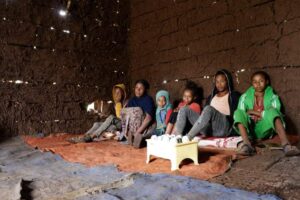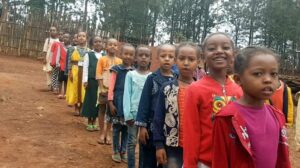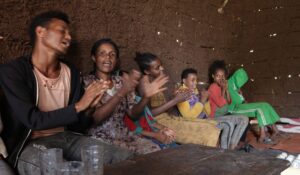“I knelt down and prayed, ‘Lord, don’t let me fail. You are my portion.’ Not even my relatives helped me, only God did. He stands with the deprived and underprivileged ones. And here is my house. Blessed be the name of the Lord. I also thank all of you that have helped me. May your children be blessed. May they not have any challenges as I have experienced. Next to the Lord, I am calling a blessing to all of you.”
Regarded a “Rebel”
Our visit has not gone unnoticed. The entire time we were there, curious onlookers shamelessly gawked at us and refused to leave. Though relatively friendly to us and keeping some distance, they appeared to be taking stock of everything Hiwot and her children did. It was very uncomfortable—a small taste of what the constant surveillance and scrutiny must feel.
In small villages such as this one, there is an intricate interdependency within a community for
survival. And religion is part of the collective tradition. If anyone renounces the tradition, it upsets the whole social system. It often has devastating consequences for the “rebel.”

Across sub-Sahara Africa, this kind of side-lining (as a rebel) is a deeply hurtful persecution tactic that affects every aspect of believers’ lives. If they are not supported, marginalized Christians may become vulnerable to further persecution and even backsliding, as mounting hopelessness and loneliness can cause them to start seeing themselves as their society does – the scum of the earth.
On the fringes of her community is where we meet Hiwot*, a widow and mother of eight. Even before her conversion, life has not always been kind to her. But recently, things have become even more unbearable at the hands of her community, which bullies her children and excludes her from gatherings. These challenges have her on the brink of giving up.
When Children Are Bullied

Hiwot talks passionately, gesturing with her hands, “I am so angry when they pick on the children.” She starts talking about a specific incident that happened during Debo, a custom within the village that requires everyone to help plough or harvest.
“My younger son went to help a family prepare their land. The people started to argue and pick a fight with him. So, my eldest went to help my younger son. He picked up a farming implement to protect his brother. Now, the community elders have fined me 600 birrs.”
Hiwot and her children live hand to mouth. If she had extra money, Hiwot believes it could have been better spent on things other than a (baseless) fine. Moreover, Hiwot worries about how they will survive if the community continues to make life so difficult for them. “The Lord gave me this home, but the people refuse to give me peace. I wonder if I should close the door and rent a small house in town… at least I can sell charcoal there. I am so irritated!”
“I was truly worried this week. I thought, is it not better to close my door and move to town?”
“The difficult thing is raising the children. My eldest son broke his right hand and now he can’t use it to plough. Two of the younger children have daily wage jobs that they use to buy clothes and some basic things…”
Hiwot’s neighbors exclude her from meetings and try to make her life as difficult as possible. At gatherings, such as funerals, they pepper her with questions. “They ask me, ‘Why did you become Pente (Protestant)? Why are you not like us? Why cannot you be with us?”
Hiwot knows they look down on her. “Oh, I do not care, I have the Lord already. I have God and I am happy.” Somehow, Hiwot can make light of this side of her burden. It is only when we ask how she feels about her family being cast out that her tone changes.
Still Thankful And Undaunted
Hiwot is thankful for the help OD has given her, but her needs are still big. Her neighbors have done an outstanding job of making life insufferable. Staying or going is a choice only she can make. Whatever the decision, we would like to help her towards resilience and support her as she lives out a clear testimony in front of her unbelieving neighbors. We would like to help Hiwot and her children have a more viable livelihood.
“If one wants to work, anything is possible.” Hiwot’s undaunted tone returns. “If I have cows or
goats, I can fatten them up and sell them for income. This will help me with the children.”
“Open Doors stood by my side and through the Lord, you have been there for me.”
Before we leave, Hiwot and the children extend one last gesture of kindness: preparing a meal for us. They have so little and yet insist on sharing what they have. We oblige and enjoy with the family some kocho, a type of flat bread made from the false banana, and Ubasha cabbage.

Open Doors
Open Doors began in 1955 when a young Dutch missionary named Andrew Van Der Bijl (known today as Brother Andrew) went to then-Communist Eastern Europe. He met Christians in desperate need of Bibles, prayer support, and encouragement. There, he had received a calling from the Lord – to strengthen what remained (Revelation 3:2).
Brother Andrew smuggled Bibles and Christian literatures into dangerous places, encouraged persecuted believers, and recruited people to help him. The ministry expanded and became an international organization serving in over 60 countries.





